Oct 3, 2024 – Meeting with Seoul Superintendent of Education Candidate, Celebration of Publishing “Pureun Baedal Malchip” Book
Hello. Today is National Foundation Day, when our ancestors first opened the gates of heaven and descended beneath the sacred tree on Mount Taebaek to begin the great work of benefiting humanity. It is also the day of the celebration for publishing “Pureun Baedal Malchip”, a book that explains Korean words using Korean.
After completing his morning practice and meditation, Sunim headed to the Peace Foundation. At 9 AM, Jung Geun-sik, a candidate running for the Seoul Superintendent of Education by-election, visited Sunim to greet him.
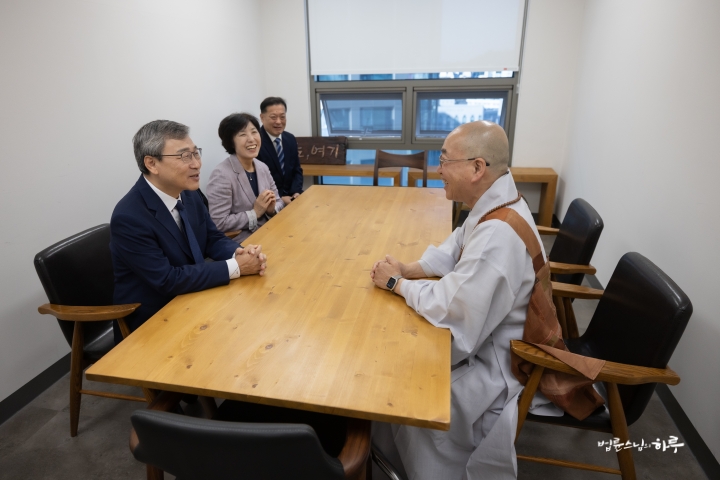
“Today is the first day of official campaigning, and I started my first schedule by visiting Venerable Pomnyun Sunim. I’ve learned a lot from observing Sunim’s activities, so I came to visit.”
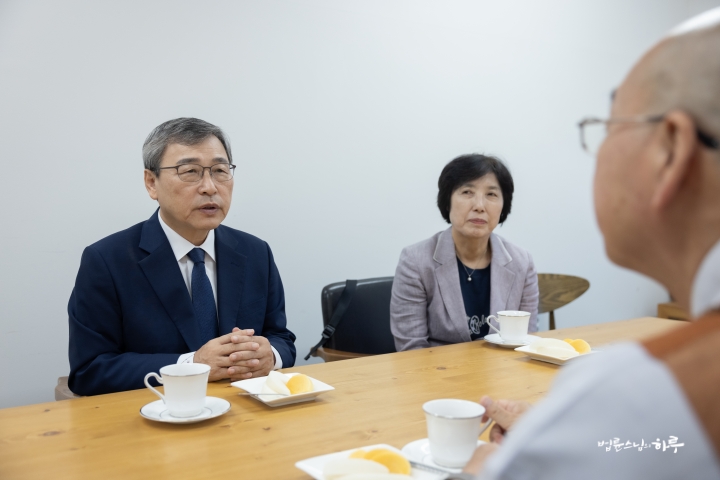
The candidate explained that he had served as the chairman of the Truth and Reconciliation Commission and decided to run for election after retiring from Seoul National University last year because the country was in such turmoil. His wife, who graduated from Jungto Sutra School, accompanied him to meet Sunim. Sunim shared his thoughts on education issues with the candidate.
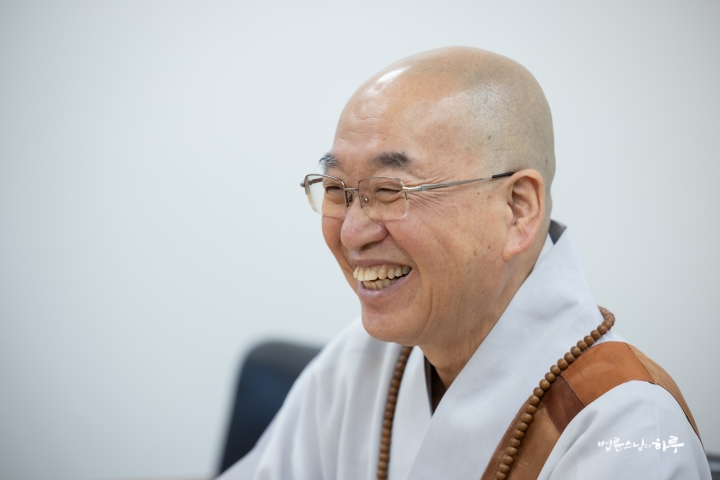
“A school is a place for both teaching and learning, but strictly speaking, it should be defined as a place for learning. If we define it as a place for learning, students become the owners of the school, whereas if we define it as a place for teaching, teachers become the owners – this is a big difference. Teachers are there to help students learn. So I think we should take the perspective that students should learn as voluntarily as possible, and teachers should play a supporting role in helping that.
Education for Fostering Creative Talent
In the past, teachers taught everything in detail, but nowadays, I think the education system should change so that students watch videos of knowledge-based content in advance, and during class time, students discuss among themselves with teachers assisting. This is how creative education can be achieved. In most classrooms in our country, teachers still explain alone at the front while most students doze off. Until now, imitation education has been very successful in developing Korea, but we can no longer overcome the stagnation phase with imitation education. To nurture creative talent that can respond to future society, we need to change the education system first.”
“I completely agree with your thoughts, Sunim.”
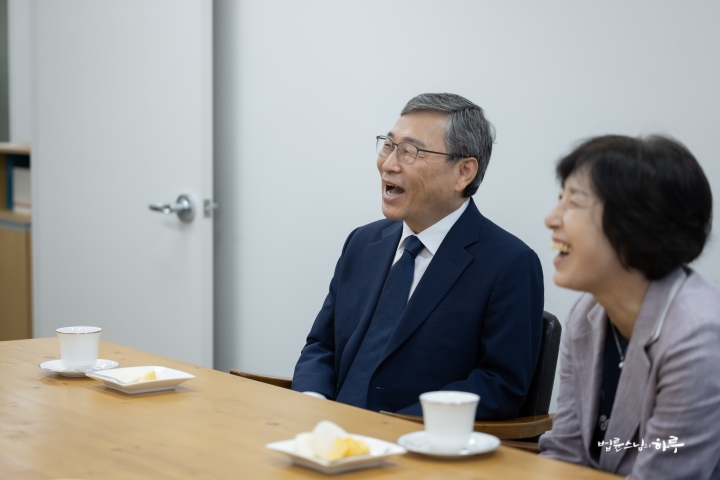
“Education reform is really difficult. Teachers received old-fashioned education. Parents received old-fashioned education. Education administrative officials received old-fashioned education. Everyone has only received old education and has no experience with the future. But children have to live in the future. Although there will be many difficulties, I hope you will make many new attempts looking ahead to the future.”
Sunim shared many stories about the direction Korean school education should take, including the trial and error Jungto Society experienced in transitioning online.
“Thank you so much for your valuable words today.”
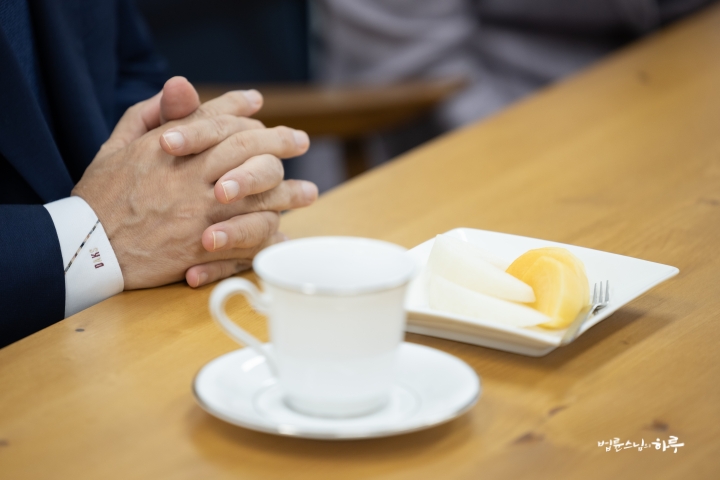
After finishing the conversation, they took a commemorative photo together.
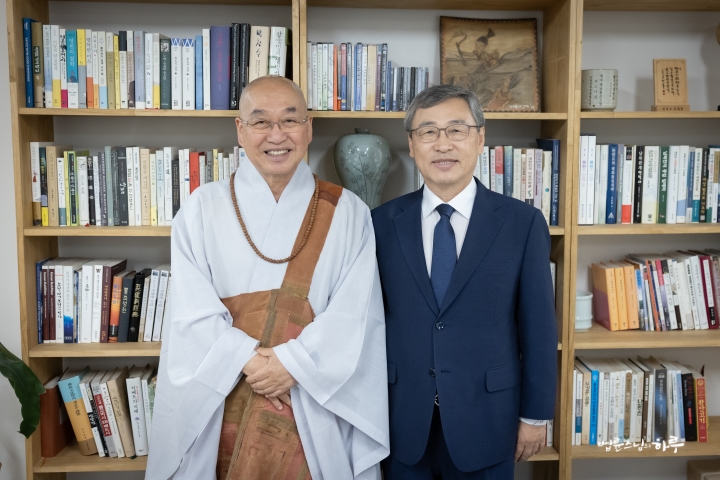
“You’ll be busy starting today. I hope you have good results.”
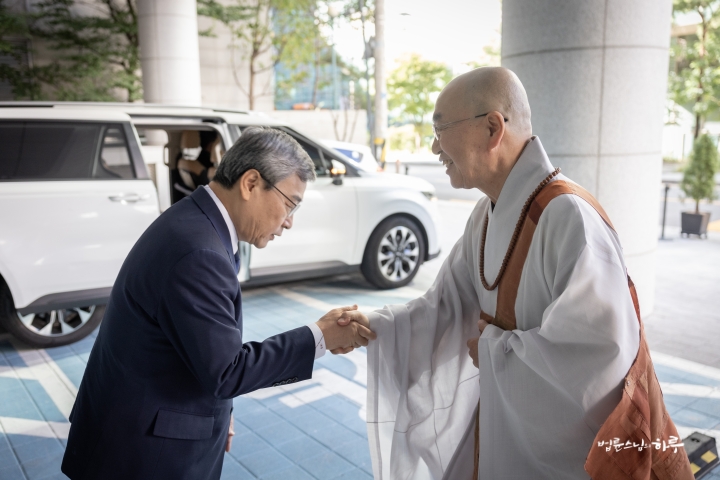
After lunch, Sunim greeted guests at the cafe on the 2nd floor of the Jungto Social and Cultural Center from 1:30 PM. Today is the day of the celebration for publishing “Pureun Baedal Malchip”, a book that explains Korean words using Korean. Many people who have put a lot of effort into cultivating the Korean language gathered in one place.
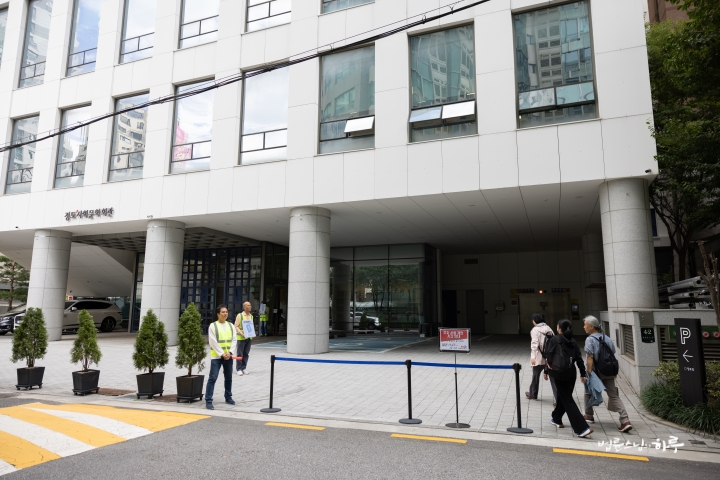
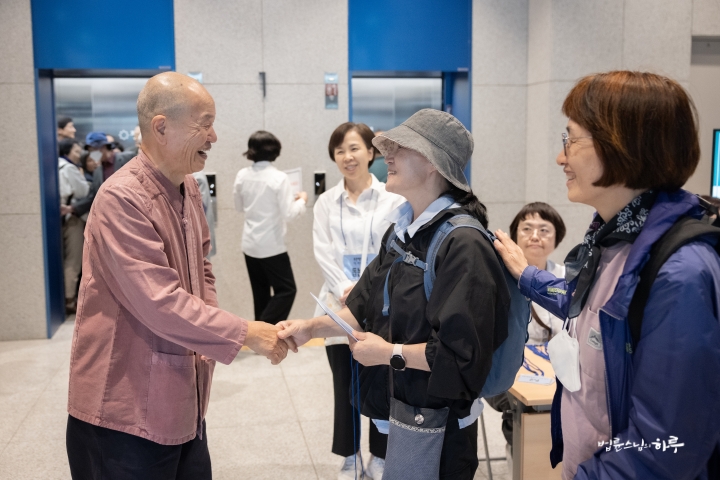
After greeting each other warmly, everyone moved to the basement auditorium where the book celebration was held at 2 PM.
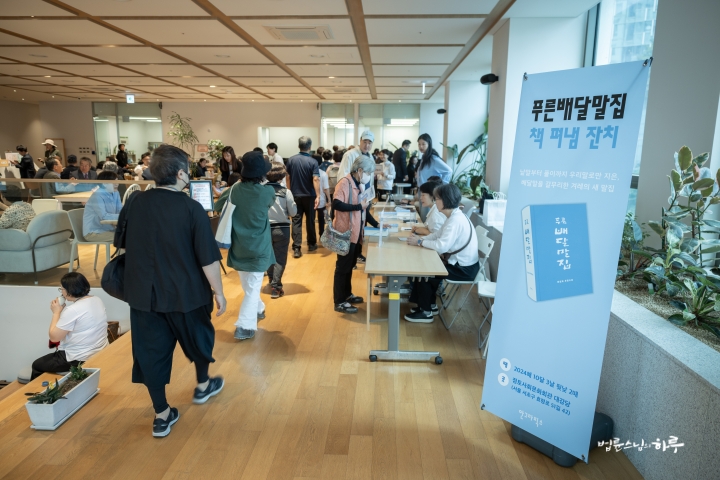
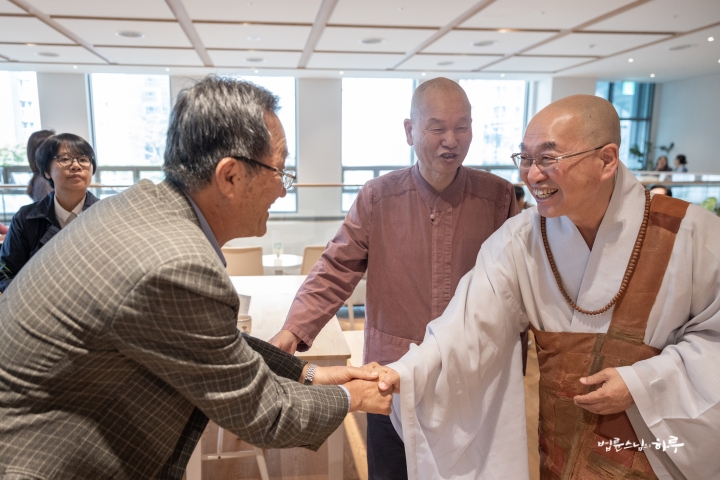
First, as an opening performance, Han Jae-kyung and Lee Sang-shin beautifully sang “Our Language Song” and “Evergreen Tree” with their beautiful voices.
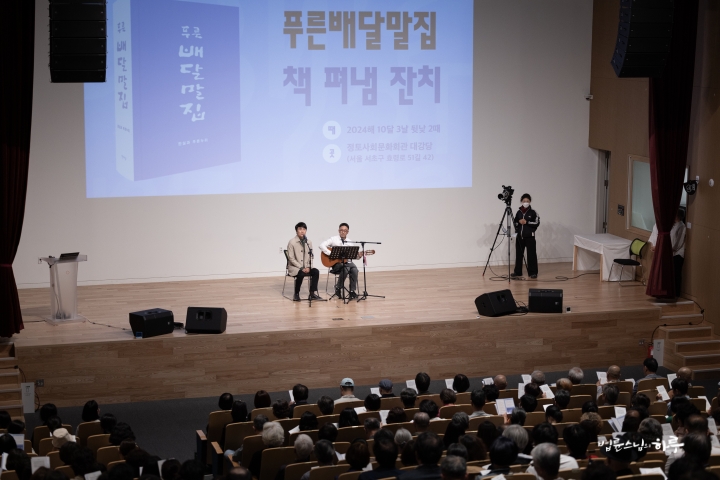
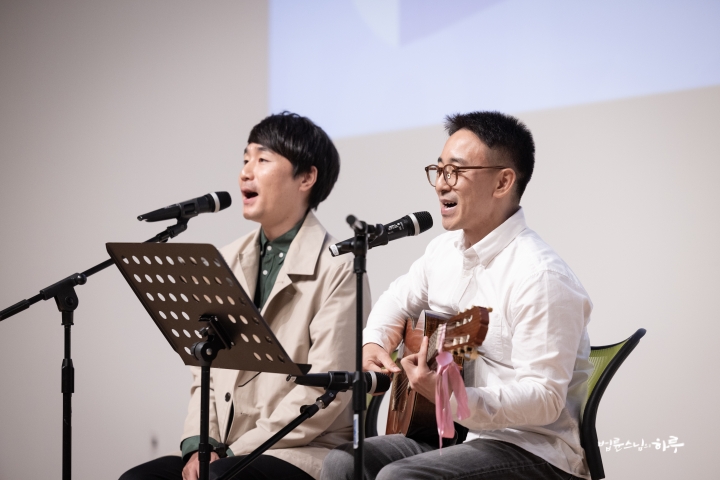
♬ Let’s use easy Korean words, easy words ♬
♬ Words we used since childhood, words we spoke with puppies ♬
♬ Shepherd’s purse, dandelion, pasque flower, violet, wild grape, Korean wild grape, hardy kiwi, acorn, Minnow, willow, crucian carp, Korean gudgeon, loach ♬
♬ Cuckoo cuckoo cuckoo, cuckoo cuckoo cuckoo, moorhen moorhen moorhen ♬
They opened the book celebration stage wide with a wonderful song that touched our hearts.
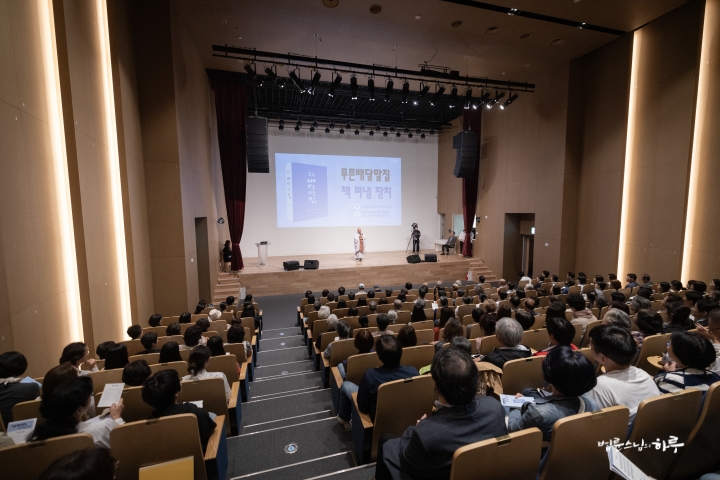
Next, Sunim gave opening remarks to start the book celebration.
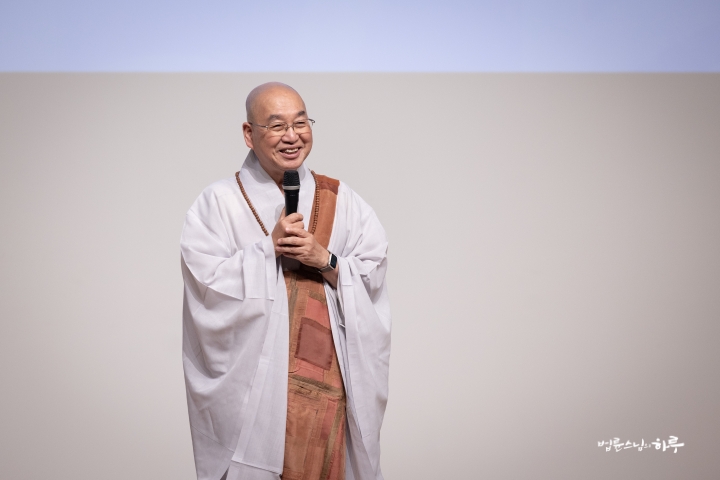
“I should change my name from ‘Pomnyun (法輪)’ to ‘True Word Wheel’ as well. When I call myself ‘True Word Wheel’, I can immediately understand what I should do. When I was called ‘Pomnyun’, there were many times when I didn’t quite grasp what I should do. (laughter)
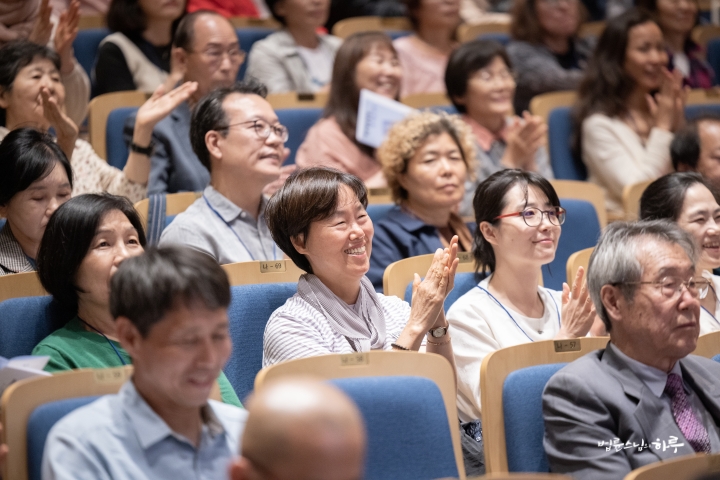
Mr. Choi Han-sil are publishing “Pureun Baedal Malchip” on October 3rd, National Foundation Day. It feels truly meaningful that we are holding this event on the day when heaven first opened, not by coincidence. This year marks the 4,356th year since Dangun Wanggeom ascended to the throne. Most people seem to misunderstand, but National Foundation Day does not commemorate the day Dangun Wanggeom first ascended to the throne, but rather the day when Hwanung Cheonhwang descended from heaven and first founded the Bae-dal nation. It is said that Hwanung Cheonhwang founded the Bae-dal nation with the spirit of “Hongik Ingan (弘益人間)” which means to widely benefit humanity, and “Jaese Ihwa (在世理化)” which means to recreate the advanced civilization of “Hannara” where he lived before coming to this land.
Usually, when an advanced civilization enters a less developed region, it often involves invasion or exploitation. However, when about 3,000 people from the advanced civilization of “Hannara” migrated to this Northeast Asian region to found our country, there was no invasion or exploitation. Rather, the founding spirit of our country was to enlighten the people of the less developed region and benefit them with a better civilization. This spirit was not only the founding ideology but also contained a deeper love for the people than any religion. This shows that our ancestors had such a noble intention from the very founding of the country.
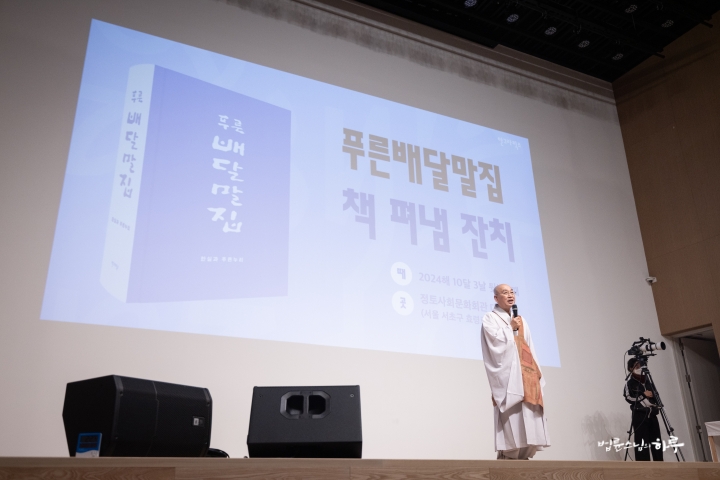
According to the stories passed down, this year marks the 5,960th year since Hwanung Cheonhwang opened the gates of heaven and founded the Bae-dal nation. If so, it would be appropriate to call this year the 5,960th year of Gaecheon (Opening of Heaven) and the 4,356th year of Dangi (Era of Dangun). However, even government events express National Foundation Day as the day Dangun Wanggeom first founded the country. This means that the national identity regarding the roots of our country is still not well established.
Four Major Difficulties the Korean Language Had to Face
It is said that we had our own writing system called Garimto from ancient times. However, our writing system was not used in daily life, and we eventually adopted Chinese characters to express our language. As we expressed our language using ideograms, we couldn’t express words using phonetic symbols, and the Chinese characters introduced to write actually changed our language. This was the first difficulty our language had to face. However, only 5 percent of the population, including a minority of Confucian scholars and the ruling class, learned Chinese writing, so the Korean language used by the common people could be passed down as it was.
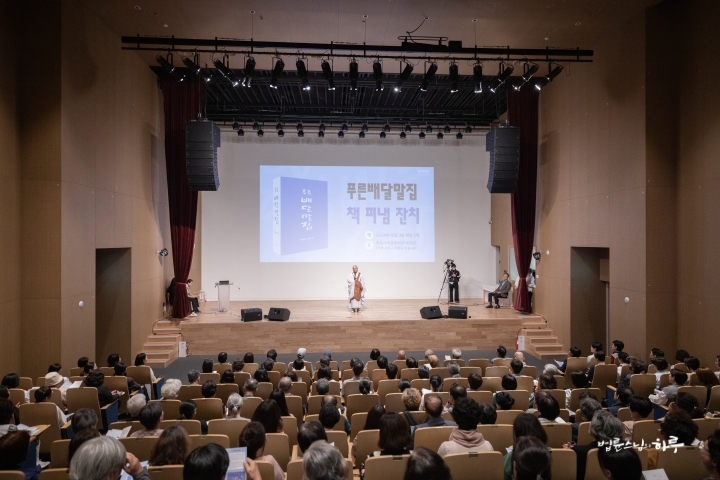
The second difficulty our language faced was during the Japanese colonial period when elementary school education was implemented, and all those who received school education learned Japanese-style Sino-Korean words. Even I often use Japanese words thinking they are Korean words when speaking. While Chinese words during the Joseon Dynasty affected only a minority of 5 percent of the population, Japanese words had a much greater impact on our language because they affected a much wider range of people through elementary school education.
The third difficulty was that after liberation, the content of modern education in elementary schools changed from Japanese to Korean, but the language used was still Japanese. If we hadn’t received school education, we might have preserved more of our language, but national education meant that the entire population received school education. In the process, as we directly translated Japanese textbooks into Korean textbooks, we lost a lot of our language.
The fourth difficulty arose after liberation when we received Western education. Today, we often replace Korean words with English. While we often use Japanese-style words without realizing they are Japanese, mistaking them for Korean, we rarely mistake Western words for Korean, which is a difference.
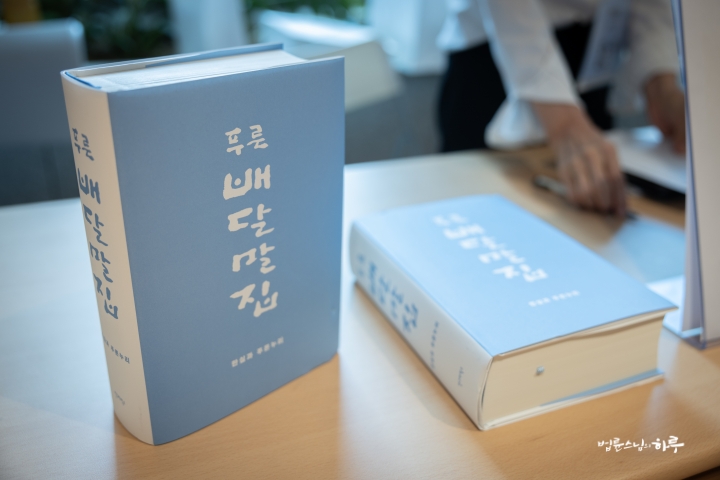
Many people have continued their efforts to solve these various difficulties of our language, and now Choi Han-sil has come to publish “Pureun Baedal Malchip”. She has finally created “Pureun Baedal Malchip” today after doing this difficult work for a very long time. She has done a really hard job. I hope we deeply appreciate how difficult a job they have done and what is contained in this book, and use our language as much as possible.
This might be mistaken for some kind of nationalist concept that opposes foreign languages and advocates using only our own language, but I don’t think so. If our country didn’t have its own language, we could borrow and use other countries’ languages, but the problem is that we are using other countries’ languages even though our language is easier, more concise, and conveys meaning more quickly. It’s really unfortunate that we have lost more of our language due to this mistaken idea that using our language somehow lowers us, while using formalized words like Sino-Korean words seems like honorific language. Now that everyone has become equal and the people have become the owners of the country, it would be good to try using our language that can better express our hearts.
However, even I often use words that have become familiar through school education, which are mostly Japanese words. Especially in Buddhism, we use many Sino-Korean words, so it’s often difficult to use Korean words even if we try. So I sometimes think, ‘Wouldn’t it naturally work if we go back to childhood and use the words that children use?’
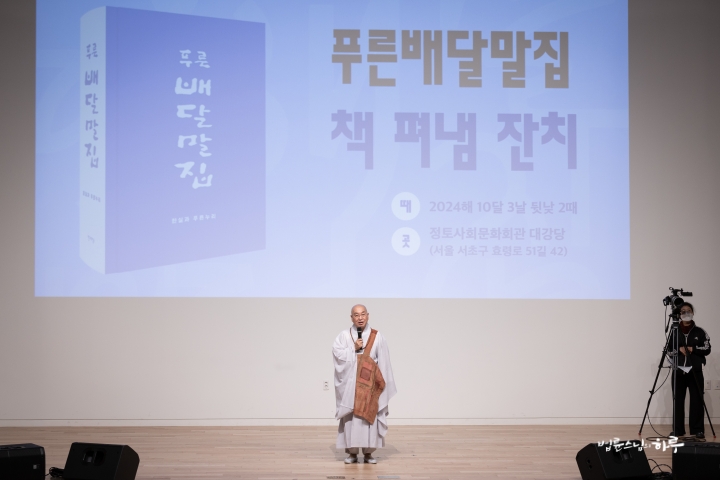
I often go to poor countries to build schools or provide school supplies for children’s literacy. Since those countries don’t have many children’s songs, we sometimes translate our children’s songs into their language. Every time we do this, there are words that we can’t translate no matter how hard we try. Do you know what they are? They’re onomatopoeias. We can’t express the sound of a cuckoo bird in their language. From my experience so far, no language expresses sounds as well as our language.
Especially in children’s songs, aren’t there many expressions of bird sounds and animal movements? But onomatopoeias like ‘woof woof’ are difficult to express in other languages in most cases. Seeing that our language can be written as it sounds, I could really feel how excellent our language is. On top of that, Hangul is being revealed in many studies to be an extremely suitable writing system for computer and artificial intelligence fields.
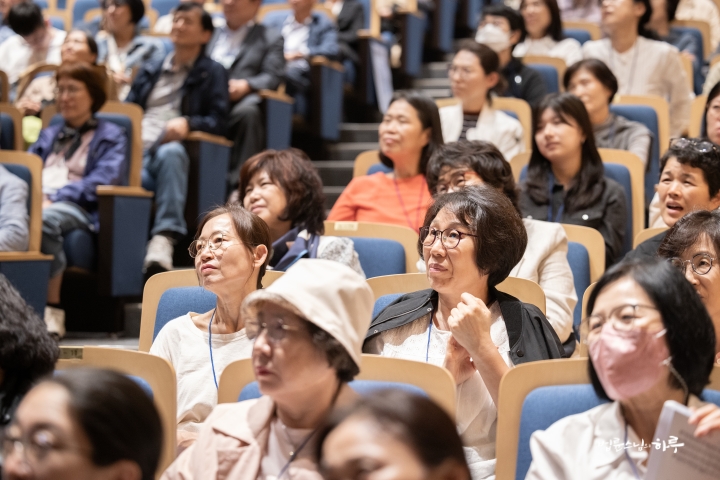
These days, Korean culture, music, and dramas are being widely spread abroad as the Korean Wave. When I go abroad, just like how we used to say ‘thank you’ or ‘good morning’ even when we couldn’t speak English as children, people everywhere in the world know how to say ‘annyeonghaseyo’ or ‘gamsahamnida’ in Korean when they see me. Our language is spreading all over the world like this, and the global population wanting to learn Korean culture is among the top five.
How Can We Exercise Creativity?
The citizens of our Republic of Korea, with its long history and tradition, already had the DNA to manifest this Korean Wave historically. It’s because we had this foundation that our culture could develop like this today, not simply because we made efforts recently. To become a little more creative, I think we need to know more deeply about our language and our history. Hasn’t most of our education so far been about imitating the technology and culture of other countries? But the imitation method has now reached its limit. To pioneer new things and exercise creativity, we need to fuse what is uniquely ours with what has come from outside. I’m not saying we should insist only on our traditions. When we know our traditions better, we can also develop pride in our hearts. This event was organized with such an intention.
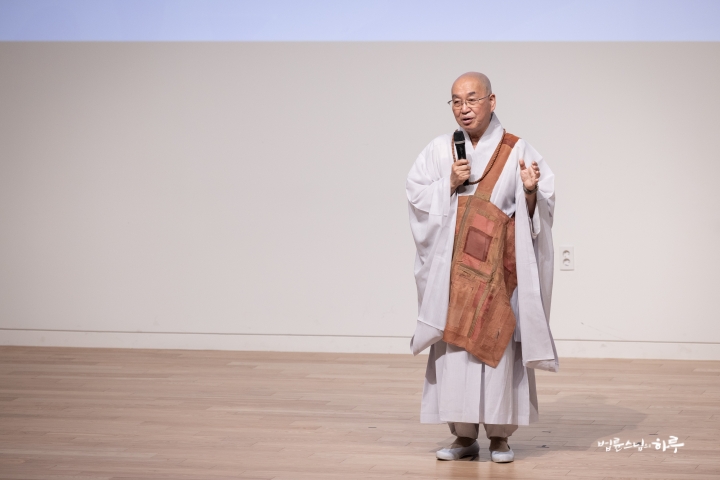
Many distinguished guests are present today. Those who participated in the democratization movement with Mr. Choi Han-sil, those involved in the farmers’ movement, and seniors and juniors who have worked in various fields to preserve our culture have joined us. Also, many people who love our language and members of Jungto Society are in attendance. I express my gratitude once again. I hope you will listen carefully to Mr. Choi Han-sil’s lecture on ‘Using Our Language to Keep It Alive’ and that we will start using our language ourselves.”
Next, Deulkkot from Pureunnuri shared the story of how the book “Pureun Baedal Maljip” came to be, along with a video presentation.
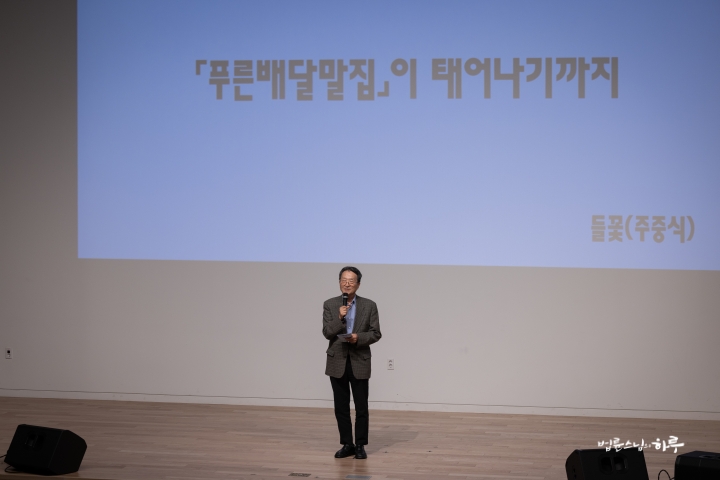
“In 2014, at the ‘Native Language Lovers Meeting’ held in Jinju, I met Kim Su-eup and heard about ‘Our People’s Language and Life,’ which is when we first set our minds to create a dictionary. Despite many difficulties, Han-sil didn’t give up and walked steadily day and night to fulfill her initial goal. Eleven years after setting that first goal, ‘Pureun Baedal Maljip’ was finally published.”
It was a touching moment to witness Mr. Choi Han-sil’s determination to walk the path of reviving our language without giving up.
Next, they heard from Professor Lee Ki-sang, who wrote the sharing note for this book, followed by a speech from An Mano, the representative of Ahn Graphics Publishing House, which published “Pureun Baedal Maljip.”
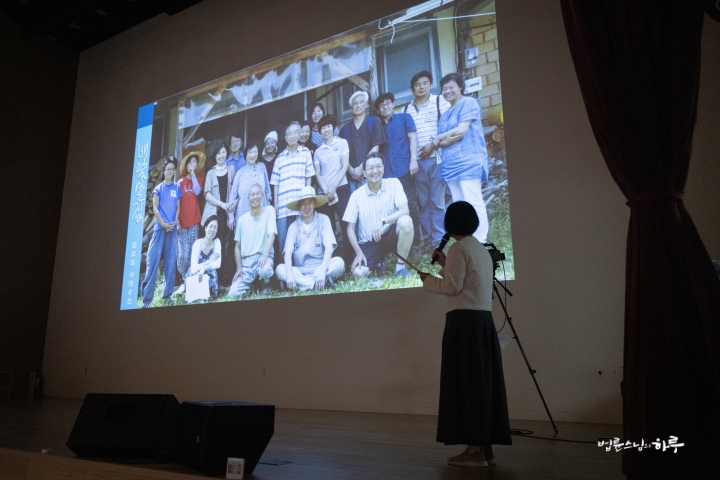
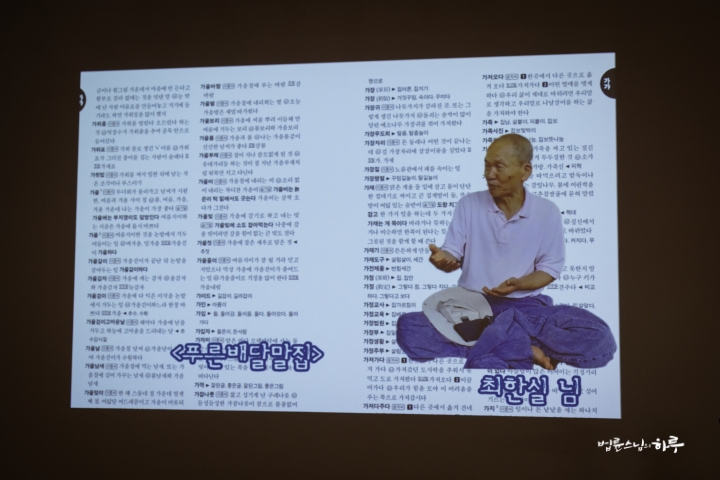
Next, they listened to the words of Mr. Choi Han-sil, the author of this book. As the host announced that he would invite his to the stage with a big round of applause, Mr. Choi Han-sil smiled and began speaking.
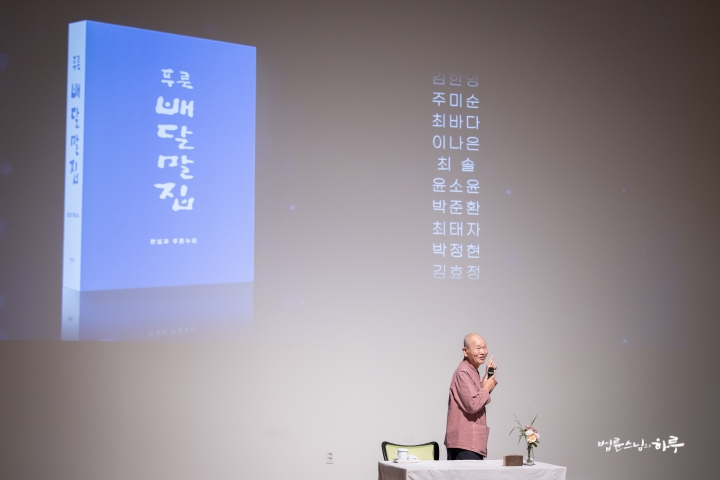
“We were just asked to give a big round of applause, but how do we express ‘applause’ in our language?”
“Son-ppeok (hand clapping).”
“Now, let’s give a big son-ppeok once more.”
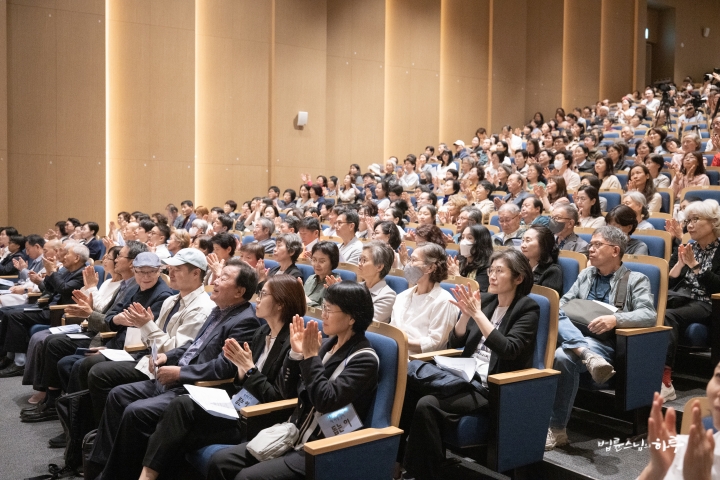
He began his talk about our language while everyone clapped loudly.
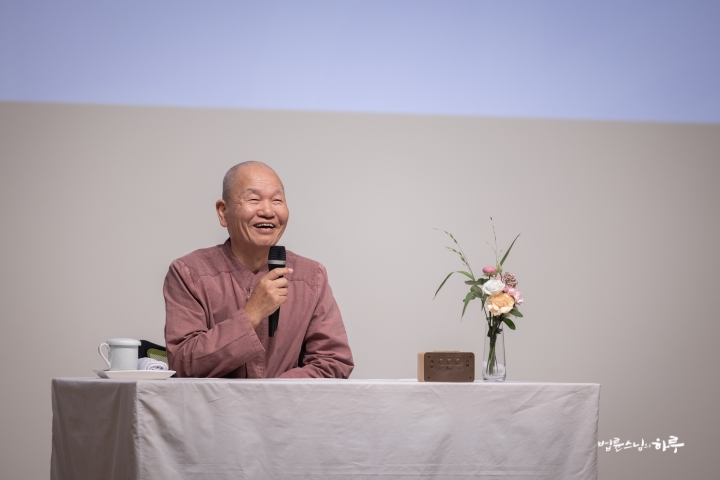
“Our native words should flow naturally when we open our mouths, but how did we end up using foreign words so often? We could simply say, ‘How do I use this tool?’ but instead, we use difficult expressions like ‘What is the usage method of this machine?’ The word ‘use’ is a Japanese-derived term. We have the simple expression ‘mal’ (word), yet we insist on saying ‘eon-eo’ (language).
In our language, we call a school ‘baegot.’ Today, most of the words we learn and use in baegot come from Japanese. If we were lacking native words and needed to borrow from other languages to enrich our vocabulary, it would be understandable to adopt words from other countries. However, the words that came from Japanese have pushed out perfectly good native words and taken their place.
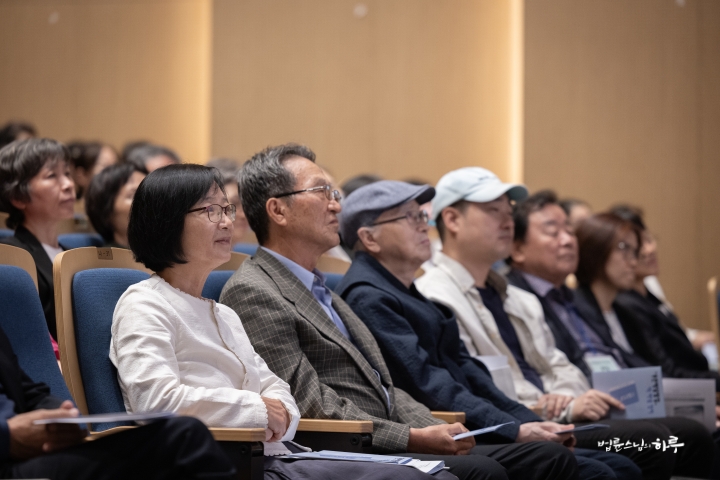
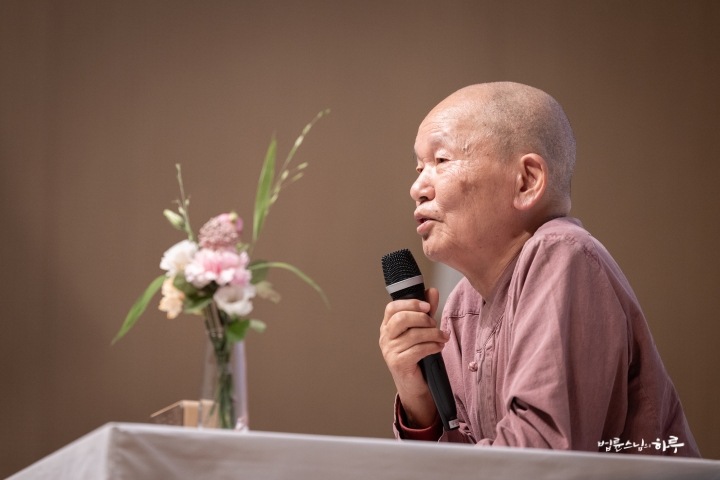
I invited you today for a ‘book celebration,’ but ‘book launch’ is a Japanese-derived term. These days, people don’t even use ‘book launch’ anymore, they use ‘book concert’ more often. When eating at a ‘bapjip’ (rice house), it feels like eating at a low-class place, so most people say they eat at a ‘sikdang’ (restaurant), and nowadays, saying you eat at a ‘restaurant’ makes it sound like you’re eating at a high-class place. (Laughter)
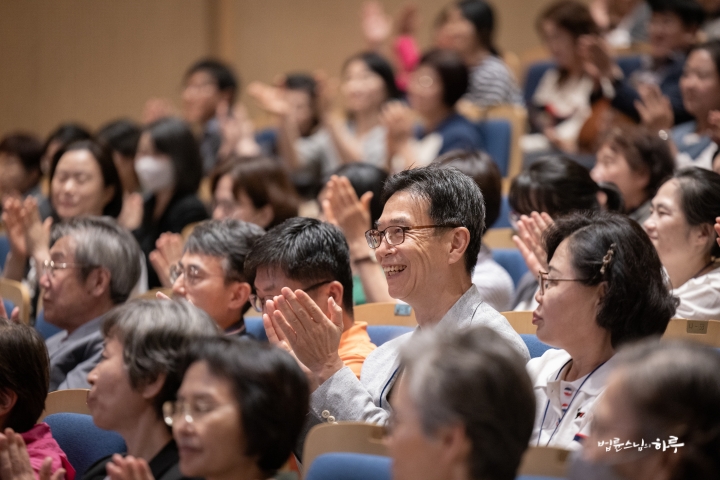
The Korean word for ‘person,’ ‘saram,’ comes from ‘salam,’ which combines ‘sal’ meaning ‘to live’ and ‘am.’ It means the best-living life among all living beings. Our people created the word ‘saram’ with this meaning. Therefore, a person should not live carelessly but should live well. The word ‘saram’ implies that one should not only have a calm and content mind but also live well in all aspects. Our people did not consider someone living well alone while others around them were starving to death as a true ‘saram.’ It was our people’s way to offer even an empty room to those without a home.
Although it’s late, it’s right to reclaim and use our language now. Reviving our language, which embodies our spirit, is an act of saving our people and strengthening our country from its foundations.”
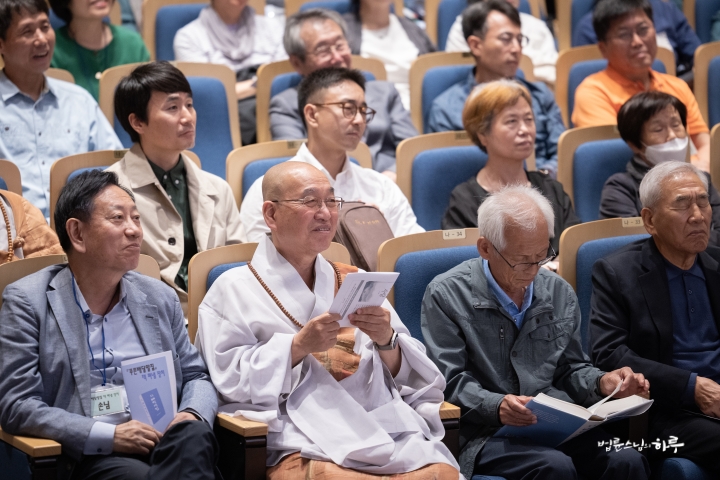
Mr. Choi Han-sil provided numerous examples of commonly used Japanese and English words, demonstrating how replacing them with native Korean words can bring out their true meaning and illuminate the spirit of our people.
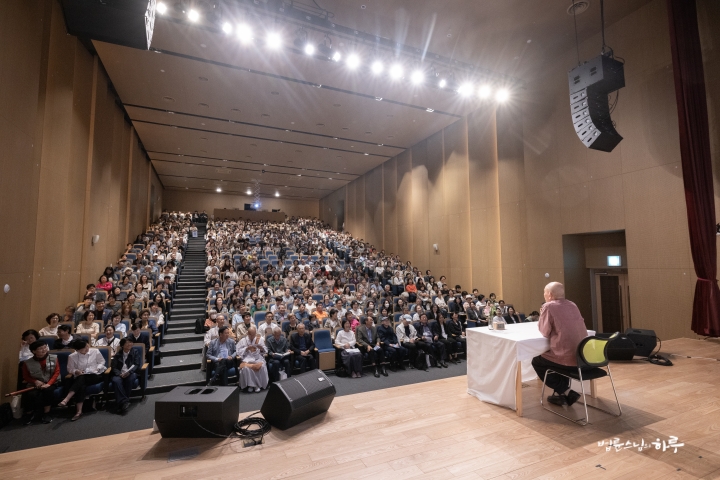
Finally, after a Q&A session addressing curious points, the lecture concluded. This was followed by a Korean language riddle session. Mr. Choi Han-sil posed questions, and the audience raised their hands to answer correctly.
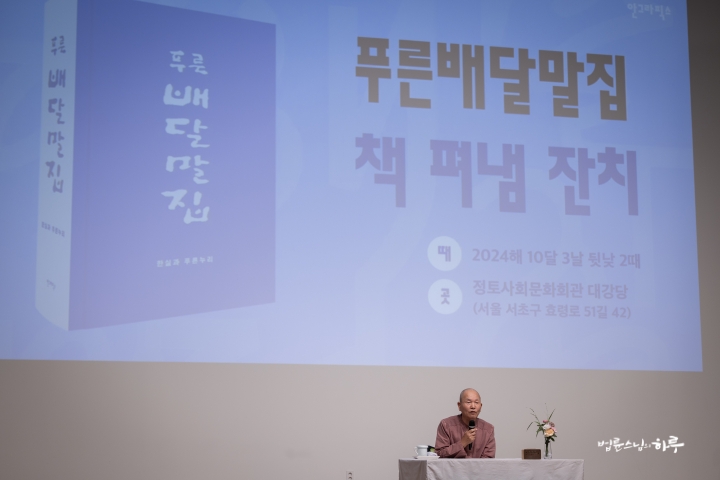
“How do you read 365 days in Korean?”
“Seo-on-yeosun-datsae-il.”
“How do you read the year 2024 in Korean?”
“Duzeumun-seumulne hae.”
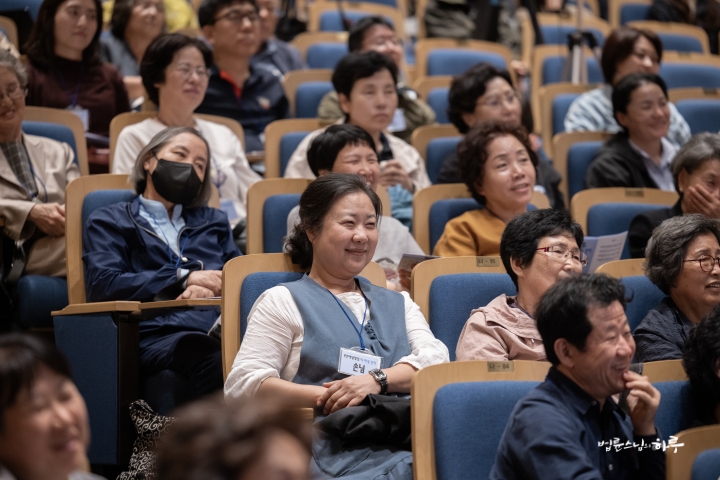
As they solved riddles, it was time to conclude. Those who answered correctly received eco-friendly gifts.
It was a time to understand why our people should use our native language, even now. After the book celebration, they all took a commemorative photo together.
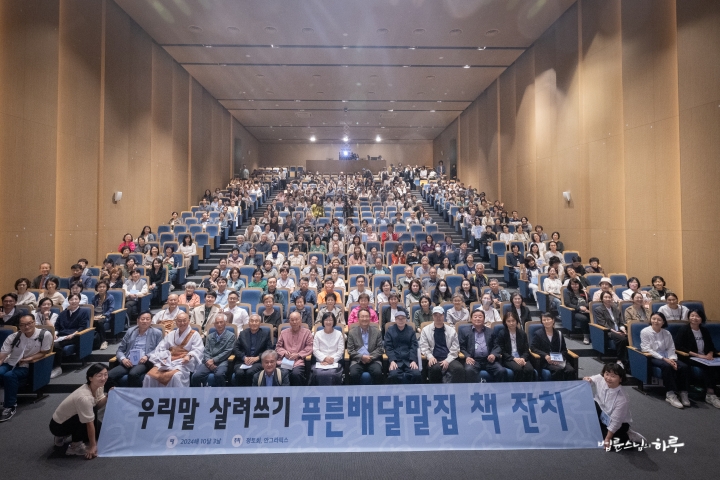
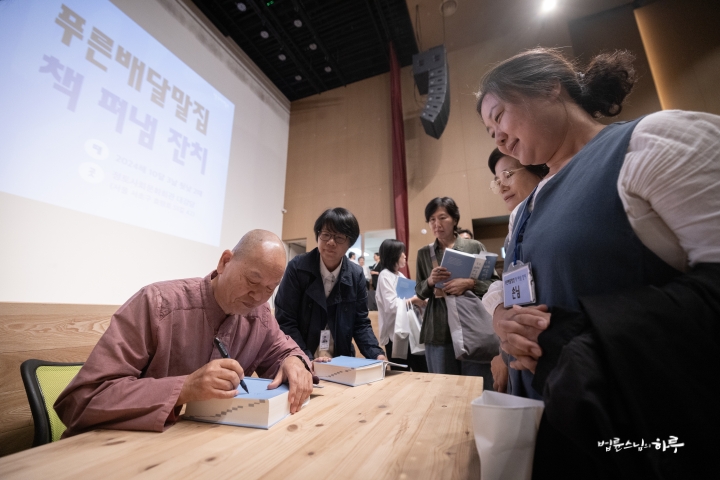
Following this, there was a book signing session on stage, after which they moved to the second-floor cafe for a post-event gathering. Mr. Choi Han-sil personally gifted chestnuts he had collected from the mountains to the attendees.
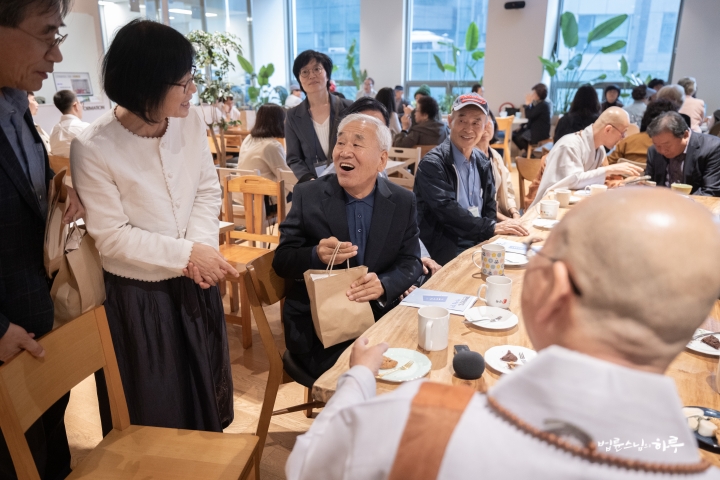
Sunim also shared tea and conversation with the guests. He mentioned that, unlike Western learning, he plans to embark on a pilgrimage in late November to commemorate the 200th anniversary of the birth of Choe Je-u, who founded Donghak from an independent and subjective standpoint. Sunim and the guests also had extensive discussions about Donghak.
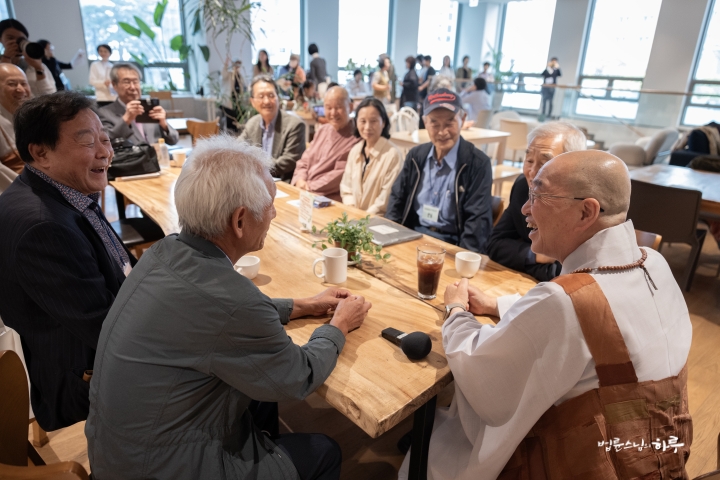
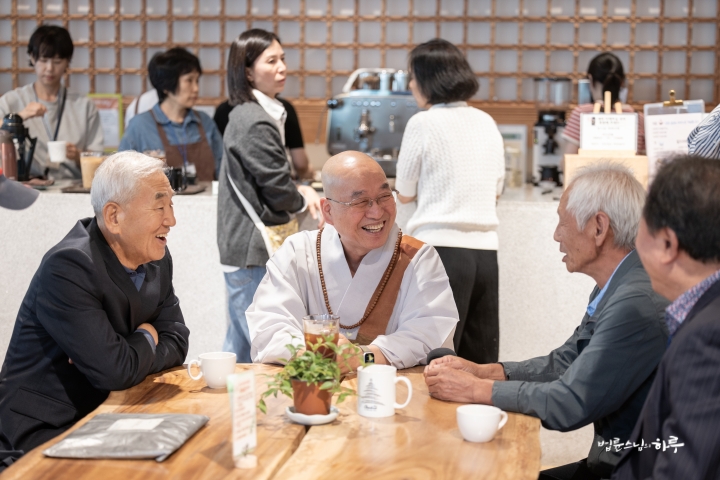
After seeing off Mr. Choi Han-sil and the guests, Sunim departed for Dubuk Retreat Center at 5 PM.
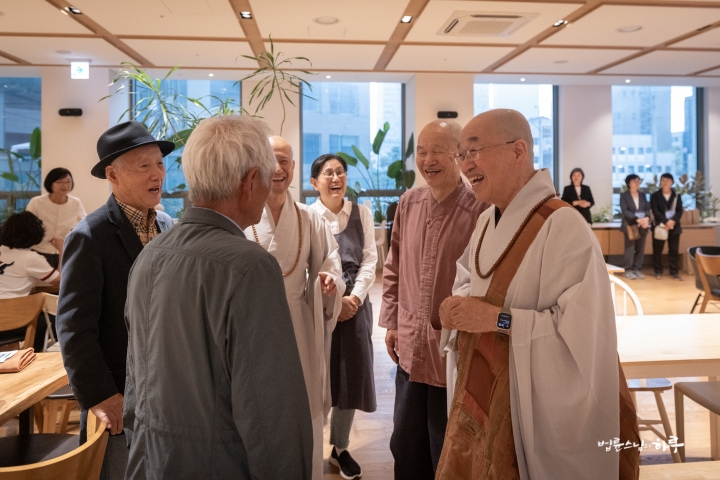
After a four-hour drive, he arrived at Dubuk Retreat Center at 9 PM and concluded his day’s activities.

As there was no Dharma talk today, this article will share a conversation between Sunim and a questioner from the Dharma Q&A held in Auckland, New Zealand on September 7th.
How to Recover Borrowed Money Without Causing Hurt
“Does this person have extra money now, or not?”
“They talk about stock investments every morning. They also discuss making money with their colleagues. It seems they do have extra money.”
“When you gave the money, did you just give it or lend it?”
“We invested in a business together, and when I withdrew midway, we agreed that the money would be returned to me.”
“Then you can simply say, ‘Please return the money as we agreed.'”
“I’ve mentioned it several times and received small amounts. It seems they’re treating the remaining amount as if it never existed.”
“You can remind them that there’s still an outstanding amount.”
“I sent a message about it, but after some time passed, there was no response at all. Actually, it’s my older brother.”
“Try sending regular messages. ‘Please return the money. $4,000 is still outstanding. I’m in a bit of a difficult situation.’ It’s good to send messages regularly like this. Keep sending messages whether there’s a response or not. Why should you do this? It’s not just about getting the $4,000 back. By doing this, your brother won’t be able to ask to borrow money again in the future. If you get the money back this way, that’s great, but even if you don’t, the other person won’t be able to ask to borrow money again, so it has a preventive effect. That’s why you should never just let it go.
Regularly, whenever you meet, say, ‘Please return that money. I’m in a bit of a difficult situation.’ Don’t provoke anger, but send a message when they might have forgotten, and then send another when they might have forgotten again, but don’t irritate them. This way, they can return the money when they’re in a good mood. If you provoke them too much, not only will the relationship deteriorate, but they might also decide, ‘You’re being petty about money. I won’t give it to you even if I have it.’ Then you won’t get the money back, and the relationship will worsen. But if you leave it alone, they’ll forget. So you need to remind them regularly. If you get the money back, that’s great, but even if you don’t, it has a preventive effect.”
You shouldn’t just keep regretting the money you couldn’t get back. It’s also very important to prevent future losses. So there’s no need to be too regretful about lending a small amount of money and not getting it back. Once you have such an experience, you won’t be at risk of losing a large sum again. Consider a few thousand dollars as a deposit. By putting down this deposit, the other person won’t be able to ask to borrow money again, so it has a preventive effect.
If you focus too much on getting the money back, the brotherly affection will break, and you won’t get the money back either. If you just leave it alone, they might ask to borrow money again later, saying they’re in a difficult situation. Then you can’t refuse to lend, and it becomes awkward, right? So you need to maintain the relationship appropriately, like fishing bait, pushing and pulling.”
“I understand well. Thank you.”
Tomorrow, the seventh Happy Dialogue Dharma Q&A of this year is scheduled to be held in Gwangju.




